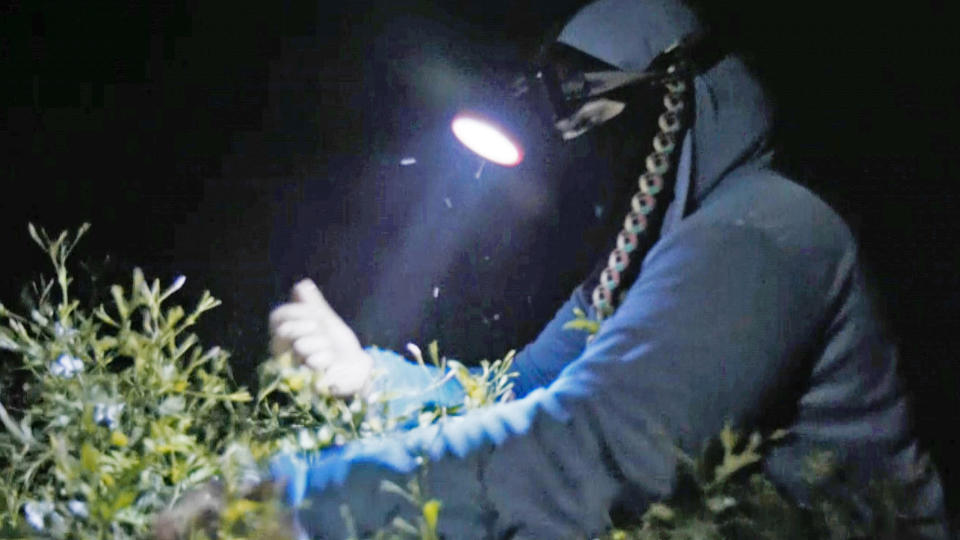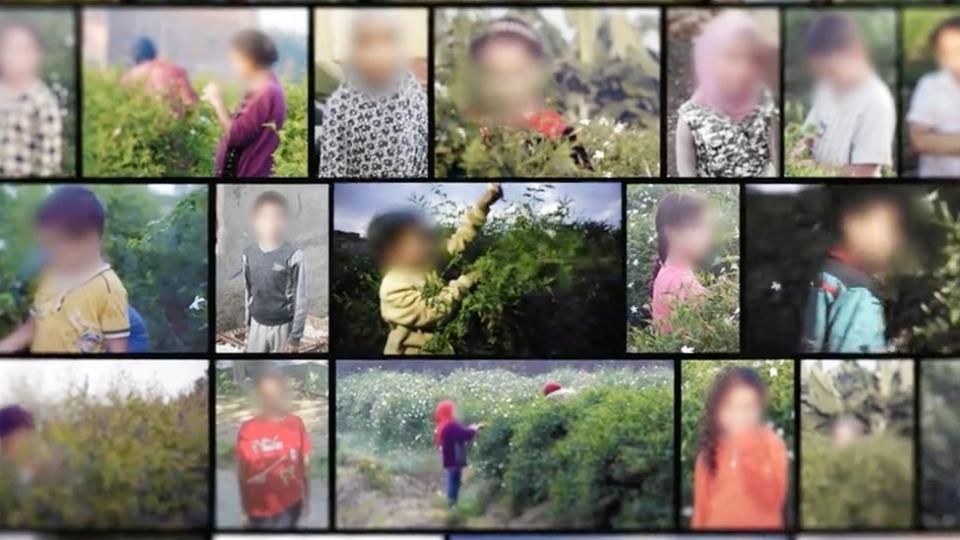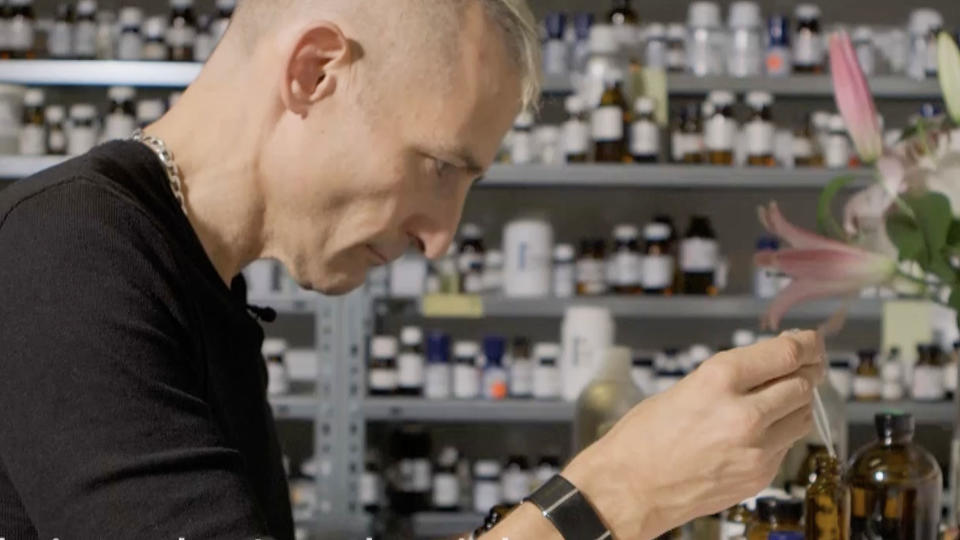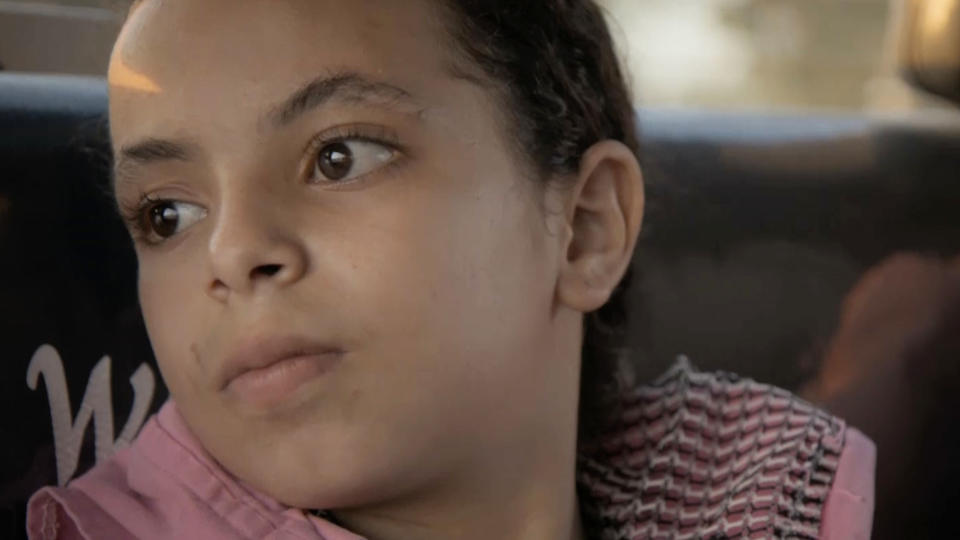The children chose ingredients used by suppliers from two major beauty companies, the BBC can reveal.
A BBC investigation into perfume supply chains last summer found that the jasmine used by Lancôme and Aerin Beauty suppliers was picked by minors.
All luxury perfume brands claim to have zero tolerance for child labor.
L’Oréal, owner of Lancôme, said it is committed to respecting human rights. Estée Lauder, owner of Aerin Beauty, said she has reached out to her suppliers.
The jasmine used in Lancôme Idôle L’Intense – and Ikat Jasmine and Limone Di Sicilia for Aerin Beauty – comes from Egypt, which produces about half of the world’s supply of jasmine flowers – an essential ingredient for perfumes.
Industry experts told us that the handful of companies that own many luxury brands are tightening budgets, resulting in very low wages. Egyptian jasmine gatherers say this forces them to involve their children.
And we discovered that the audit systems the perfume industry uses to check supply chains are deeply flawed.
The UN Special Rapporteur on contemporary forms of slavery, Tomoya Obokata, said he was disturbed by the World Service’s evidence, which included secret filming in Egyptian jasmine fields during last year’s harvest season.
“On paper, they [the industry] They promise so many good things, such as supply chain transparency and the fight against child labor. Looking at this footage, they’re not actually doing the things they promised to do.”
Heba – who lives in a village in the Gharbia district, in the heart of Egypt’s jasmine region – wakes her family up at 3am to start picking the flowers before the sun’s heat damages them.
Heba says she needs help from her four children – aged between 5 and 15. Like most jasmine harvesters in Egypt, she is known as an “independent harvester” and works on a small farm. The more she and her children can harvest, the more they will earn.
The night we filmed her, she and her children managed to harvest 1.5kg of jasmine flowers. After paying a third of her winnings to the land owner, she was left with about $1.5 [£1.18] for work that night. This is worth less than ever, given that inflation in Egypt is at its highest level and waste pickers often live below the poverty line.

Heba’s daughter Basmalla, 10, was also diagnosed with a severe eye allergy. At a medical appointment we attended with her, the doctor told her that her vision would be affected if she continued picking jasmine without treating the inflammation.
Once harvested and weighed, the jasmine is transferred via collection points to one of several local factories that extract the oil from the flowers – the main three are A Fakhry and Co, Hashem Brothers and Machalico. Every year, it is the factories that set the price of the jasmine harvested by people like Heba.
It’s difficult to say exactly how many of the 30,000 people involved in Egypt’s jasmine industry are children. But during the summer of 2023, the BBC filmed in this region and spoke to many residents who told us that the low price of jasmine meant they needed to include their children in their work.


We witnessed that in four different locations, a significant number of waste pickers working on small-scale farms – which supply the main factories – were children under the age of 15. Several sources also told us that there were children working on farms directly owned by the Machalico factory, so we went to film there undercover and met collectors who told us that their ages ranged from 12 to 14 years old.
It is illegal for anyone under the age of 15 to work in Egypt between 7pm and 7am.
Factories export jasmine oil to international fragrance houses where perfumes are created. Swiss-based Givaudan is one of the largest and has a long-standing relationship with A Fakhry and Co.


But it’s the perfume companies above them — which include L’Oréal and Estée Lauder — that hold all the power, according to independent perfumer Christophe Laudamiel and several other industry experts.
Known as “the masters,” they set a very tight budget for fragrance houses, he said.
“The interest of the masters is to have the cheapest possible oil to put in the fragrance bottle” and then sell it at the highest price possible, said Laudamiel, who spent years working inside one of the fragrance houses.
“They don’t actually regulate the wages or salaries of the harvesters, nor the real price of jasmine, because they are beyond that,” he explained.
But he said that because of the budget they set, the pressure on wages is “enough” – for the factories and, ultimately, for the waste pickers.
“There is a huge disconnect between the preciousness talked about in the marketing discourse and what is actually given to harvesters,” he added.


In their promotional material, perfume companies and fragrance houses paint a picture of ethical sourcing practices. All employers in the supply chain have also signed a letter of commitment to the UN, pledging to respect its guidelines on safe work practices and the elimination of child labor.
The problem, according to a senior executive at fragrance house Givaudan, is the lack of oversight perfume companies have over their supply chains.
Speaking on condition of anonymity, the executive said these companies rely on fragrance houses to instruct third-party auditing firms to verify due diligence.


Leading perfume brands may have “the worst form of child labor” in their supply chain, a BBC Eye investigation reveals.
Watch now on BBC iPlayer (UK only). For international audiences, watch on YouTube




BBC Eye Investigations found that when the sun sets in Egypt, there is a hidden human cost to the industry.


The auditing companies most cited by conglomerates and fragrance houses on their websites and in letters to the UN are Sedex and UEBT. Their audit reports are not publicly available, but by posing as a buyer looking for ethically sourced jasmine, we managed to get the factory A Fakhry and Co to send us both.
The UEBT report, based on a visit to the factory last year, shows there were indications of a human rights issue, but does not go into detail. Despite this, the company has received a “verification,” meaning it can claim it offers “responsibly sourced jasmine oil.”
The UEBT, in its response to this, said: “A company has been issued with an attestation of responsible sourcing, subject to an action plan… valid until mid-2024, and will be withdrawn if… not implemented.”
The Sedex report gave the factory a glowing review, but it was clear from its text that the visit had been pre-announced and only the factory site itself had been audited, not the small farms from which it sourced the jasmine.
Sedex told us it was “firmly against all forms of labor rights abuses. But no single tool can or should be relied upon to discover and remediate all environmental and human rights risks or impacts.”
Lawyer Sarah Dadush, founder of the Responsible Sourcing Project, which seeks to improve human rights in global supply chains, said the BBC investigation “reveals… that these systems are not working”.
The issue, she said, is that “auditors only audit what they are paid to audit,” and this may not include the price paid to the workforce – “one of the main causes” of child labor.
Fakhry and Co told us that child labor is prohibited on both its farm and factory, but that the vast majority of its jasmine comes from independent collectors. “In 2018, under the supervision of UEBT, we started the Jasmim Plant Protection Products Mitigation Project, which prohibits children under 18 from working on farms.” It added that “by any comparable standards in Egypt, jasmine harvesting is well remunerative.”
Machalico said he does not use pickers under the age of 18 and said he has increased the price he pays for jasmine over the past two years, and will do so again this year. Hashem Brothers said our report was “based on misleading information.”


Givaudan, the fragrance house that produces Lancôme Idôle L’Intense, described our investigation as “deeply alarming”, adding that “it is up to all of us to continue taking steps to fully eliminate the risk of child labor”.
Firmenich, the fragrance house that makes Ikat Jasmine and Limone Di Sicilia for Aerin Beauty, and in summer 2023 acquired jasmine from Machalico, told us it was now using a new supplier in Egypt. He added that he will “support initiatives that seek to collectively address this issue with industry partners and local jasmine farmers.”
We also hand over the conclusions of the investigation to the masters of perfumery.
L’Oréal said it is “actively committed to respecting the most protective internationally recognized human rights standards”, adding that it “never requests[s] Fragrance Houses must stay below the market price of ingredients at the expense of farmers. Despite our strong commitments… we know that in certain parts of the world where L’Oréal suppliers operate, there are risks that our commitments will be met.”
He added: “Whenever an issue arises, L’Oréal works proactively to identify the underlying causes and how to resolve the issue. In January 2024, our partner carried out a human rights impact assessment on site to identify potential human rights violations and find ways to prevent and mitigate them, with a focus on child labor risks.”
Estée Lauder said: “We believe that the rights of all children must be protected. And we have reached out to our suppliers to investigate this very serious matter. We recognize the complex socioeconomic environment surrounding the local jasmine supply chain and are taking steps to obtain better transparency and work to improve the livelihoods of supplier communities.”
Back in Gharbia, jasmine collector Heba was shocked when we told her the price at which the perfume was sold on the international market.
“The people here are worthless,” she said.
“I don’t mind people wearing perfume, but I want people who wear this perfume to see the pain of children in it. And speak.”
But lawyer Sarah Dadush said it was not the consumer’s responsibility.
“This is not a problem that should be solved by us. We need law…we need corporate responsibility, and that can’t just fall on consumers.”


































/cdn.vox-cdn.com/uploads/chorus_asset/file/25447697/1589887063.jpg?w=150&resize=150,150&ssl=1)